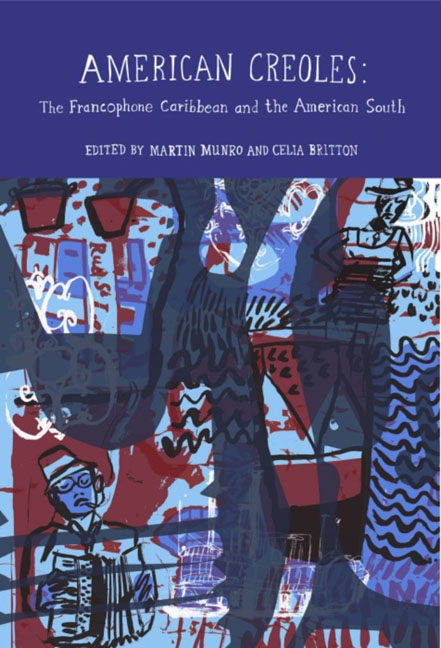Book contents
- Frontmatter
- Contents
- List of Illustrations
- Acknowledgements
- Introduction
- Creolizations
- Music
- ‘Fightin’ the Future': Rhythm and Creolization in the Circum-Caribbean
- Leaving the South: Frantz Fanon, Modern Jazz, and the Rejection of Négritude
- The Sorcerer and the Quimboiseur: Poetic Intention in the Works of Miles Davis and édouard Glissant
- Creolizing Jazz, Jazzing the Tout-monde: Jazz, Gwoka and the Poetics of Relation
- Intertextualities: Faulkner, Glissant, Condé
- Notes on Contributors
- Index
Leaving the South: Frantz Fanon, Modern Jazz, and the Rejection of Négritude
from Music
- Frontmatter
- Contents
- List of Illustrations
- Acknowledgements
- Introduction
- Creolizations
- Music
- ‘Fightin’ the Future': Rhythm and Creolization in the Circum-Caribbean
- Leaving the South: Frantz Fanon, Modern Jazz, and the Rejection of Négritude
- The Sorcerer and the Quimboiseur: Poetic Intention in the Works of Miles Davis and édouard Glissant
- Creolizing Jazz, Jazzing the Tout-monde: Jazz, Gwoka and the Poetics of Relation
- Intertextualities: Faulkner, Glissant, Condé
- Notes on Contributors
- Index
Summary
In his biography of Frantz Fanon, David Macey is somewhat dismissive of the scattered allusions to jazz Fanon makes throughout his work. Thus, according to Macey, the ‘parody of the négritude vision of Louis Armstrong's music’ in Peau noire, masques blancs (1952) proves that Fanon knew little about the music itself and was interested primarily, if not exclusively, in its sociological significance (Macey, 2000: 124). The promotion of modern jazz, in Les Damnés de la terre (1961), as a model for the ‘national culture’ of a newly independent Algeria, meanwhile, was simply ‘not at all pertinent’ to Algeria (ibid.: 378).
This chapter will argue that Macey has misunderstood and underestimated the significance of Fanon's various allusions to jazz. Further, his attempts to adjudicate on the question of precisely which cultural forms were or were not ‘pertinent’ to any discussion of the Algerian situation appear to rely upon a set of unquestioned assumptions about ethnic or national identity, the particular cultural forms appropriate to that identity and the specified geographical locations to which those cultural forms might hence be considered ‘pertinent’. In this sense, his rather dismissive comments regarding Fanon's interest in jazz might be seen as broadly analogous to Françoise Vergès's critique of what she sees as Fanon's ‘disavowal’ of the ‘reality’ of his Creole identity in favour of a reinvention of his ‘filiation’ and ‘symbolic ancestry in Algeria’ (Vergès, 1997: 579). Where Macey criticizes the impertinence of Fanon's attempts to relate modern jazz to the Algerian situation, Vergès criticizes the impropriety of his pretence to an Algerian ‘filiation’ that can only, in her view, be based on a ‘disavowal’ of his true identity. Both critics seem to possess a strong and rather sententious sense that agents and cultural forms alike have their rightful place or true identity and should stick to that place or identity. Implicit in Macey's and Vergès's remarks, then, is the call for Fanon to be brought back into line, to acknowledge his true identity, and discuss cultural forms which express that identity only in relation to the specified geographical location from which they are taken to originate and to whose political or cultural dilemmas they remain, exclusively, pertinent.
- Type
- Chapter
- Information
- American CreolesThe Francophone Caribbean and the American South, pp. 129 - 146Publisher: Liverpool University PressPrint publication year: 2012



